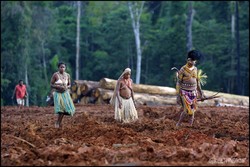
Logging operations are only ramping up, and exploiting special leases, meant for the development of agricultural projects, to clear forest on land belonging to customary owners.
PNG government indicating logging for agricultural development will continue
by Eric Tlozek
TIM PALMER: Exploitation of Papua New Guinea's vast rainforests has seen the country become the largest exporter of logs in the world.
The large-scale logging has intensified environmental concerns, and the PNG government has just promised to stop the export of unmilled rainforest logs, to improve forest sustainability.
But logging operations are only ramping up, and exploiting special leases, meant for the development of agricultural projects, to clear forest on land belonging to customary owners.
PNG correspondent Eric Tlozek reports.
ERIC TLOZEK: The northern part of the border of Papua New Guinea and Indonesia is dominated by a towering rainforests - and the Asian logging companies who are clearing it.
They're using the pretext of agricultural development to gain access.
Eddie Tanago, is a social justice activist for the charity Act Now PNG. He's been representing landholders from isolated villages across Papua New Guinea, who have lost their land to companies on 99 year special agricultural business leases, or SABLS.
EDDIE TANAGO: The loggers in the guise of saying that they are general and agricultural companies, they come in the excuse of doing agriculture, they come in to do logging. So we see SABLS has been abused in the process.
ERIC TLOZEK: Peter Wuni is a landholder from Bewani, home to PNG's largest SABL. He says he's been threatened after he spoke out against the lease.
PETER WUNI: We want development, but the development is not being fully delivered to the people.
ERIC TLOZEK: Like many landholders, Peter Wuni is worried about the large scale loss of the rainforest.
Joel Esse is another land holder who says the logging is affecting the many small communities who rely on the rivers and the forest for food and water.
JOEL ESE: We have nowhere to go and hunt fish and collect all our needs and wants in the forest like the first of our ancestors and our parents know how to do.
ERIC TLOZEK: The operators of the Bewani project didn't want to speak to the ABC, but unlike many other operators on SABLS, they are actually planting oil palm and appear to be developing an agricultural business.
A government inquiry and investigations by international monitoring organisations have found many of the other operators are simply logging or making token efforts at agricultural development.
Rick Jacobsen is from environmental transparency organisation, Global Witness.
RICK JACOBSEN: There's little or no agricultural development, but a lot of logging. In those cases we suspect that these agricultural leases are actually just being used as a front.
ERIC TLOZEK: Papua New Guinea's forestry minister Douglas Tomuriesa says the government doesn't wish to penalise those operators who have invested heavily in SABLS.
Mr Tomuriesa says the government is waiting on a final report from a special taskforce investigating the leases. He says it will then work with the companies to ensure they're operating legally and with the consent of landowners.
DOUGLAS TOMURIESA: You have to deal with each one of them based on their status, and when I say status, we are talking about how much development has been down there and if it's illegal, if it’s (inaudible).
ERIC TLOZEK: But Rick Jacobsen from Global Witness says logging operations have been ramping up while the government holds various enquiries.
RICK JACOBSEN: We found that there's about 40 per cent of PNG's timber exports are coming out of those types of leases. So now we're in we're in late 2015 and yet not a single one of those logging operations has stopped.
So we're talking two-and-half years later and the government hasn't done anything as far as we can tell to stop what's happening on the ground, which is really resulting in irreversible harm to PNG's landowners and their forests.
ERIC TLOZEK: The PNG government says it will release the findings of its taskforce and start working with the operators of the leases in the near future.
TIM PALMER: Our correspondent Eric Tlozek reporting.











